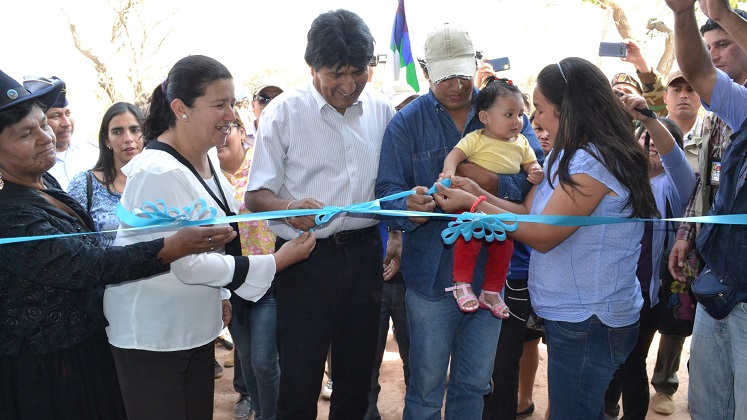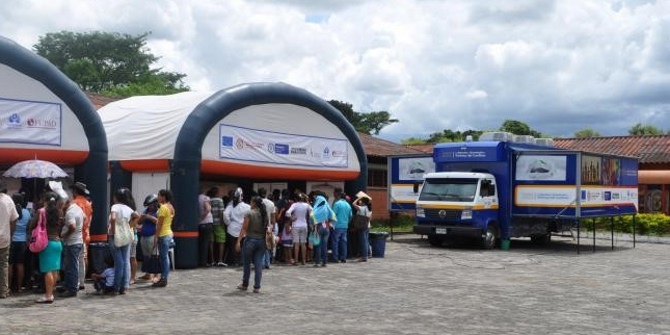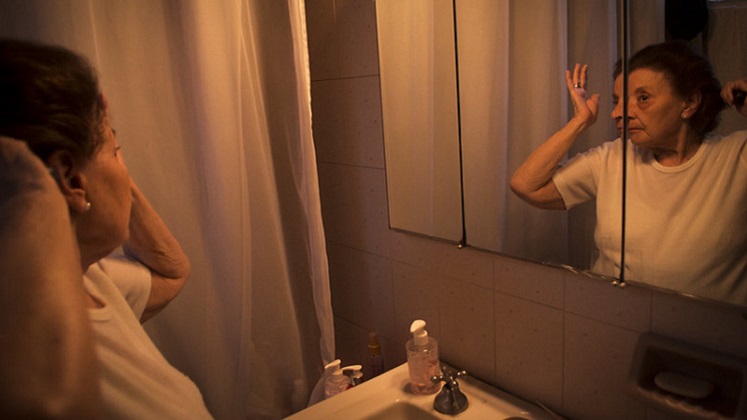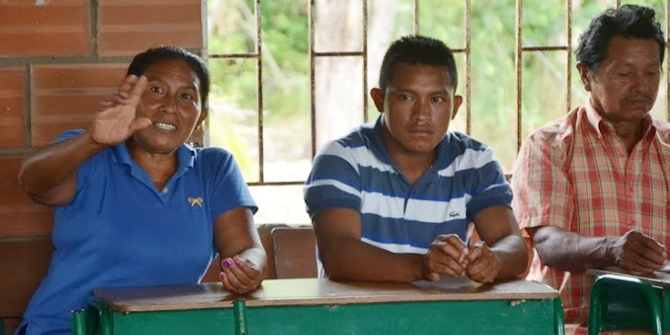With the election victories of Gabriel Boric in Chile and Gustavo Petro in Colombia, a new era of left administrations begins in Latin America. What lessons can these governments learn from the coproduction of public services during the pink tide of the early twenty-first century? Geoff Goodwin (University of Leeds), Miranda Sheild Johansson (University College London), Patrick O’Hare (University of St Andrews) and Jonathan Alderman (Ludwig Maximilians Universitat München) explain.
Lee este post en español
The pink tide of left-leaning governments that swept across Latin America at the start of the twenty-first century, including Rafael Correa in Ecuador, Evo Morales in Bolivia and José Mujica in Uruguay, made important changes to the delivery of public services. Outcomes were mixed, both within and between countries, but, overall, the quality and coverage of public services improved, following decades of decline in the 1980s and 1990s.
One important feature of this diverse process was the active participation of Latin American citizens. During the pink tide, public services were delivered not only by state bureaucracies, municipal governments, public utilities, and non-governmental organisations but by a wide range of social collectives, including families, communities, cooperatives, and social movements.
There was nothing new about this. Latin American citizens have a long history of directly participating in the delivery of public services, including water, housing, education, transport, and security. In many cases, these services are delivered through cooperation between state and non-state actors, with all parties making important contributions to the process. Hence, public services in Latin America are often coproduced.
In Ecuador, for example, coproduced water services play a fundamental role in the supply of drinking and irrigation water, especially to low-income families and small-scale farmers in the highland region. The typical pattern, which started to spread in the 1960s and 1970s, involves state agencies and local governments providing materials, machinery, and technical assistance and members of rural and peri-urban communities contributing labour, finance, and local knowledge. Community members take responsibility for the delivery of services, drawing on a wide range of collective relations and practices while remaining reliant on periodic contributions from the state and/or non-governmental organisations and overseas development agencies. A diverse range of community water associations have emerged through this historical process.
Another important factor that characterised coproduction in Latin America during the pink tide was the increased participation of the state. Pink tide governments were elected with mandates to increase public spending and restore public services, and they changed the dynamics of coproduction by providing more contributions, increasing regulatory oversight, and imposing strong central visions for how the outcomes of coproduction would produce new nation-states in line with government ideology. The ideas, hopes and dreams of Latin American citizens was another defining aspect of coproduction in the pink tide era. Following decades of neglect and decline, they looked to their new governments to respond to their demands and contribute to the rejuvenation of public services through coproduction.
There were significant advances in this period. Still, coproduction was often inhibited by a heavy-hand state-centric approach, which limited gains and generated political tensions. Our research into the coproduction of three different public services—water, housing, and waste—in three different countries—Ecuador, Bolivia, and Uruguay—reveals political tensions related to two connected issues – collective autonomy and subject making.
These issues stem from two general characteristics of coproduction. On the one hand, its tendency to promote engagement with and autonomy from the state and on the other, its capacity to (re) shape political relations and subjectivities. Coproduction creates spaces for citizens to take collective autonomous control of services, infrastructure, and resources, which can forge new political subjectivities. Yet it also allows governments to control citizens and attempt to align them to their political interests. Hence, coproduction can both strengthen and threaten collective autonomy and political struggles often emerge around this process, which takes distinct forms in different social and historical settings.
Our analysis, which is based on qualitative and ethnographic research, shows that these were core features of coproduction during the pink tide.
Tensions over subject making
Under Evo Morales, coproduced housing in Bolivia sought to encourage private land and home ownership; and while it enforced collective applications for urban coproduced housing, it did so only on the premise that some families would be deemed ineligible. The process therefore promoted a degree of individualism. In Uruguay, coproduced waste services during the presidencies of Tabaré Vásquez and José Mujica saw diverse attempts to transform the subjectivity of clasificadores, informal waste-pickers who had traditionally carried out the lion’s share of recycling in the country. In Ecuador, meanwhile, the Rafael Correa government implemented laws, policies and discourses to attempt to align members of community water associations to its political project—the so-called revolución ciudadana.
One common feature across all three cases was the attempt to forge ‘modern’ subjects through coproduction, whether it be waste pickers expected to leave behind the horse and cart, indigenous families required to inhabit state-designed houses, or community water associations expected to embrace new technologies and standardised organisational forms.

Discrepancies with collective autonomy
Tensions over the efforts of pink tide governments to impose their modernising visions of capitalist development through coproduction were closely connected to the issue of collective autonomy.
This was particularly apparent in Ecuador, where the Rafael Correa government imposed a state-centric legal-bureaucratic framework on community water associations. In order to be rendered legible by the state, these highly diverse organisations were expected to conform to rigid rules and adopt prescribed organisational forms, which threatened their collective autonomy.
Intriguingly, state interference in community water associations in Ecuador was described by one activist as being ‘like someone coming into your house and telling you how to live´. This was literally what occurred with the coproduction of housing in Bolivia. While there was some space for families and communities to shape the process, the decision over who would benefit from new housing or repairs was largely taken outside of communities, and some decided not to participate to preserve their autonomous decision-making capacity.
Struggles over autonomy took different forms in Uruguay where waste-pickers and their union sought to preserve the forms of autonomy available in ‘boss-less work’, whether that took place in cooperatives, in landfills, or on horse and cart. The autonomy of waste picker cooperatives was also undermined by the transition to NGO-managed recycling plants. Uruguay’s largest waste-picker cooperative, operating on municipal land, was disbanded and evicted by the local government, which instead offered the workers places in one of the new plants. Although pay and conditions improved, autonomous control over space and time was what waste-pickers missed most. The cooperative had been a social hub rather than simply a workspace. The recycling plant, by contrast, was a hygienic, policed space, complete with a security guard, who initially sought to ensure that workers did not make off with any waste objects from the conveyer belt, things that they would traditionally sell at flea markets.
The political consequences of the tensions generated through coproduction varied between the three cases, but they tended to erode popular support for left presidents and governments. In Ecuador, for example, the dispute over the new water regime undermined Rafael Correa’s political project. Ultimately, this helped pave the way for the right to seize control of the state, steer Ecuador back to the neoliberal orthodoxy, and plunge the country into crisis.
What can the current generation of left governments learn from these experiences?
First, it is important for left governments to take coproduction seriously and learn from the past to build more effective models of collaboration across different services, which as well as strengthening participatory democracy, can help to reduce inequality and exclusion, and create spaces for new forms of politics. Coproduction gives left governments the opportunity to build constituencies through creative engagement with progressive autonomous organisations and movements. The pink tide governments included in our study, especially the Correa and Morales administrations, showed little respect for the collective autonomy of progressive social collectives and were intolerant of difference.
This new generation of left governments can learn from these mistakes and harness the vibrancy and diversity of already existing autonomous organisations through novel and creative forms of coproduction, which combine meaningful contributions from the state with genuine opportunities for social collectives to shape the process at multiple scales.
Left governments also have the opportunity to design and implement laws and policies that create space for the emergence of new autonomous organisations. While collective autonomy tends to come from below, legal-bureaucratic frameworks can be designed to promote the creation and expansion of progressive autonomous organisations, which can become sources of inspiration and support for left governments – this is a real space of opportunity for these administrations.
None of this is easy or risk-free. The challenge of building constructive relationships between capitalist states and autonomous organisations, as scholars like Ana Cecilia Dinerstein have shown, is huge. Yet coproduction creates opportunities for innovation and experimentation and could provide left governments with a tool to develop plural political projects that provide a basis for the reconstruction of Latin American societies in the wake of the Covid-19 pandemic.
Notes:
• The views expressed here are of the author rather than the Centre or the LSE
• Please read our Comments Policy before commenting
• Banner image: Presidencia de Chile (Ximena Navarro) – Ministerio de la coordinación de la producción de Ecuador / LSE LACC






The reason they have no data is because it is an opinion piece, and their opinions are poorly formed. Some services might have improved, but they did so marginally and at an EXTREMELY HIGH financial and social cost. These governments were incredibly corrupt, though they invested intensely in marketting on one hand, so as to convince everyone of the views stated above, and spying and controlling their detractors through legal and other means of harrassment. As a matter of fact, Rafael Correa has been convicted and os currently in exile from his country. It saddens and surprises me to see lectures at the LSE with such poor objective analysis, selling a false view of the “pink tide”.
Interesting the concept of coproduction expressed in the post. However, it would have been useful to have some quantitative data to support the concept: normally in LAC, States are the only source of funding; on the other hand, political risk is extremly high so the concept requieres this analysis as well.